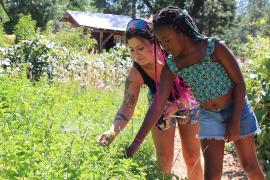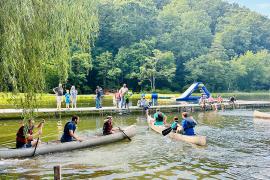If you look at history, innovation doesn’t come just from giving people incentives; it comes from creating environments where their ideas can connect. — Steven Johnson, scientist and author of Where Good Ideas Come From

What’s the most impressive innovation you have seen lately? Was it technological? Many of us equate technology with innovation, but they aren’t always synonymous. Innovation embodies human-centered processes around diverse perspectives and a desire to improve while failing. Innovation is trying new things, methods, or products that result in significant improvement of a particular field. It involves bringing creative solutions to existing problems and finding better ways of doing things. Innovation is driven by a combination of imagination, creativity, collaboration, and problem-solving skills. While technology often provides the means and resources to implement innovative solutions, it comes as no surprise to me that tech-free camp experiences are essential learning environments that intentionally nurture an innovative culture of curiosity, growth mindset, and agency in young people.
In my youth, one of the reasons I loved camp was the way each fun-filled day was packed with discovery, skills, and new perspectives. I was surrounded by nature, immersed in a tech-free community that was so different from my classrooms and neighborhood at home. We were encouraged to be inventive and think outside of the box. It taught me to think differently and challenge my assumptions. Every day brought new opportunities to learn to listen more and explore my thoughts, feelings, and beliefs more clearly. I made so many more friends and solved problems more effectively through our collaborations. I developed greater respect and understanding for differences. I used my imagination to think more creatively, more curiously, and more critically. I learned to appreciate time for reflection and self-evaluation, as well as different perspectives from diverse friends who helped me consider ideas in new ways.
As camp professionals we must prepare young people for a dynamic and evolving future. One of the key skills we must instill in them is the ability to think innovatively and adapt to changing circumstances. A thriving camp culture imbues campers and staff to ideate creatively through positive risk-taking, experimentation, making mistakes, and an open and inclusive environment where campers and staff are encouraged to share their ideas and feedback with each other. Campers are inspired by an innovative staff culture rooted in collaboration, critical thinking, and problem-solving.
What strategies are you and your team employing to foster a culture of innovation in your camp community? Explore new ways for your staff and campers to celebrate and embrace curiosity. Encourage them to ask questions, explore new ideas, and test assumptions. Teach and promote a growth mindset. Challenge your staff and campers to embrace challenges and view mistakes as opportunities for learning and improvement. Share stories about famous individuals who faced failures but eventually succeeded. Encourage everyone to step out of their comfort zones. Celebrate differences in thinking by encouraging discussions where diverse viewpoints are valued and respected. Empower campers by giving them agency over their learning. Allow them to choose projects, explore areas of personal interest, and set their own activity goals.
Finally, lead by example and demonstrate for staff and campers your own passion for learning, curiosity, and a willingness to try new and hard things. Share your own experiences of innovation and learning from failure. Prioritize innovation skills in youth development, and you’ll help equip future leaders and problem solvers with the tools they’ll need to lead and thrive in a rapidly changing world.




